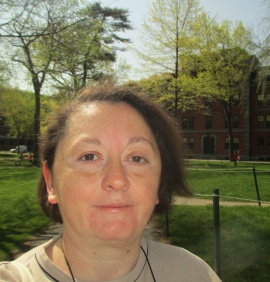ენა და კოგნიტური მეცნიერებები
ენისა და კოგნიტური მეცნიერებების შემსწავლელი სამეცნიერო-კვლევითი ინსტიტუტი მიზნად ისახავს კოგნიტური ლინგვისტიკის და მომიჯნავე შემეცნებითი მეცნიერებების ემპირიული, თეორიული, ექსპერიმენტული, კომპარატივისტულ-შეპირისპირებითი და ლაბორატორიულ-სიმულაციური კვლევების შედეგად მიღებული დასკვნებისა და შედეგების ანალიზს და მათ პრაქტიკულ კონტექსტში ჩასმას.
ინსტიტუტი ხელს შეუწყობს შემდეგი სახის კვლევების განხორციელებას:
- ფართომასშტაბიანი მონაცემების შეგროვების, ორგანიზების, გრაფიკულ-ვიზუალური გამოსახვის და ანალიზის მეთოდები;
- ხარისხობრივი, რიცხვობრივი, სტატისტიკური, მეტაკოგნიტიური და შერეული მეთოდების დახვეწა-განვითარება ლინგვისტურ-კოგნიტიურ კვლევებში;
- ტვინის ლატერალიზაცია პროსოდიულ-სინტაქსური სტრუქტურების წარმოქმნა-აღქმის პროცესში;
- ტვინის ლატერალიზაცია ლექსიკურ-სემანტური ერთეულების ათვისება-წარმოქმნის პროცესში;
- ბიოლინგვისტიკა და ადამიანისა და ენის განვითარების ევოლუციური სტადიები;
- ექსპერიმენტული ფონეტიკისა და ექსპერიმენტული სინტაქსის უახლესი საკითხების და მიღწევების კვლევა და ანალიზი;
- ფსიქოლინგვისტიკის უახლესი საკითხების და კვლევის მეთოდოლოგიური მიღწევების (EEG, Eye-Tracking, fMRI) ანალიზი და დამუშავება;
- ორენოვნობის და მრავალენოვნობის კვლევა კოგნიტიური მეცნიერებების მეთოდოლოგიური შეჯერების გზით;
- ენის ათვისების ლინგვისტურ-კოგნიტიური თეორიები;
- ენის, ენობრივი ჯგუფებისა და ოჯახების ფილოგენეტიკური განვითარების კვლევა სტოქასტურ პროცესებზე და MCMC ანალიზზე დაფუძნებით;
- ენის ევოლუციის თეორიები;
- მეტაფორების კოგნიტიურ-პრაგმატული ანალიზი და მათი მეტა-დისკურსულ ჭრილში განხილვა;
- ციპფის კანონი, სიტყვათა სიხშირე და ინფორმაციის თეორია;
- ფართომასშტაბიანი კორპუსების კვლევა სხვადასხვა ენებში;
- კორპუსზე დაფუძნებული მულტი-მედიური დისკურსის ანალიზი;
- დისკურსის ინფერენციული ანალიზი;
- უფლებებისა და ვალდებულებების გამომხატველი ტექსტების ლინგვისტური ანალიზი;
- იურიდიული კორპუსის კვლევა-შეჯერება ლინგვა ლეგის ფარგლებში;
- მასმედიის კორპუსის კვლევა მემეტიკური ინჟინერიის მეთოდით;
- სამეცნიერო კორპუსის კვლევა მეტაკოგნიტიურ ანალიზზე დაფუძნებით;
- ბუნდოვანი, ორაზროვანი მეტყველების სინტაქსურ-პრაგმატული ანალიზი და რელევანტობის თეორია;
- გრამატიკის მენტალური სივრცეები; გრამატიკის მოდულარული არქიტექტურა;
- გენერაციული და ფუნქციონალური გრამატიკის შეპირისპირება სხვადასხვა ენების მაგალითზე;
- ენის უნივერსალურ-რელატივისტური თეორიების ანალიზი;
- ენის და შემეცნების ურთიერთმიმართების კვლევა თანამედროვე ტექნოლოგიების კონტექსტში (IT, computer sciences and language).
ინსტიტუტის სამეცნიერო-კვლევითი საქმიანობის შედეგად მიღებული დებულება-თეზისები და საანალიზო-საილუსტრაციო მასალა აქტიურად გამოიყენება სწავლების პროცესში, რაც შემდგომ საფუძვლად უდევს ჰუმანიტარულ მეცნიერებათა და ლიბერალური განათლების სკოლის სტუდენტთა საკურსო თუ საბაკალავრო ნაშრომებს.
ინსტიტუტის ბაზაზე, მეცნიერ-თანამშრომელთა ხელმძღვანელობით, პრაქტიკას გადიან ჰუმანიტარულ მეცნიერებათა და ლიბერალური განათლების სკოლის სტუდენტები. მათი მუშაობის შედეგები განიხილება საუნივერსიტეტო კონფერენციებზე.
ინსტიტუტი პერიოდულად ატარებს სამეცნიერო კონფერენციებს და სემინარებს, სადაც მოწვეულ მეცნიერებთან ერთად ინსტიტუტის თანამშრომლები წარმოადგენენ საკუთარ კვლევებს.
გაეცანით ენისა და კოგნიტური მეცნიერებების სამეცნიერო-კვლევითი ინსტიტუტის დებულებას.

მარიამ ორკოდაშვილი
სამეცნიერო-კვლევითი ცენტრის დირექტორი
maiaorkodashvili@gau.edu.ge
მარიამ ორკოდაშვილი მუშაობს ქართულ-ამერიკულ უნივერსიტეტში დაარსების დღიდან. მას ასევე აქვს სასწავლო-სამეცნიერო საქმიანობის გამოცდილება შემდეგ უნივერსიტეტებში და ორგანიზაციებში: მასაჩუსეტსის ტექნოლოგ...
მარიამ ორკოდაშვილი მუშაობს ქართულ-ამერიკულ უნივერსიტეტში დაარსების დღიდან. მას ასევე აქვს სასწავლო-სამეცნიერო საქმიანობის გამოცდილება შემდეგ უნივერსიტეტებში და ორგანიზაციებში: მასაჩუსეტსის ტექნოლოგიური უნივერსიტეტი, კემბრიჯის უნივერსიტეტი, პენსილვანიის უნივერსიტეტი, კალიფორნიის ბერკლის უნივერსიტეტი, კალიფორნიის უნივერსიტეტი, ვანდერბილტის უნივერსიტეტის პიბოდის განათლების მეცნიერებების კოლეჯი, თბილისის სახელმწიფო უნივერსიტეტი, საქართველოს პარლამენტი, მაქს პლანკის ინსტიტუტი, გერმანია, ვაშინგტონის განათლების კვლევითი ინსტიტუტი, ედინბურგის უნივერსიტეტი.
ის არის ფულბრაიტის, კარნეგის, ჩივნინგის, დაადის, მასკის, კემბრიჯის განათლების კვლევის, აშშ-ს შედარებითი და საერთაშორისო განათლების საზოგადოების, USAID, INTAS TACIS სტიპენდიების და კვლევითი გრანტების მფლობელი.
მისი კვლევის სფეროებია: ნეირომეცნიერება და ბიოლინგვისტიკა, ტვინი და ენა, განათლების მეცნიერებები, ენის ათვისება და ნეიროპლასტიურობა, ფსიქოლინგვისტიკა, ენის ცვლილება და ევოლუცია, გრამატიკის კოგნიტიური წარმოსახვა, მეტაფორის ნეიროთეორია, კოგნიტიური ლინგვისტიკა, უმაღლესი განათლების მენეჯმენტი.
მისი პუბლიკაციები ასახულია შემდებ სამეცნიერო საძიებო სისტემებში: Clarivate analytics, semantic scholar, google scholar, Scopus, researchgate, academia.edu.
მარიამ ორკოდაშვილის პუბლიკაციები არის დაბეჭდილი ისეთ საერთაშორისო გამომცემლობებში, როგორიცაა: Routledge: Taylor &Francis, SAGE Encyclopedia, Oxford Studies, Oxford Symposium Books, Elsevier, Sense Publishers, Emerald Publications, Peter Lang Publishers, The Jon Ben Sheppard Journal of Practical Leadership (UTPB Publication), Heldref Publications, Raabe Publishers, Heldref publication.
მას აქვს 150 პუბლიკაცია; 4 მონოგრაფია; ციტირების ინდექსი 256.